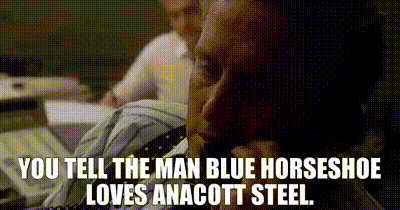Navigation
Install the app
How to install the app on iOS
Follow along with the video below to see how to install our site as a web app on your home screen.
Note: This feature may not be available in some browsers.
More options
You are using an out of date browser. It may not display this or other websites correctly.
You should upgrade or use an alternative browser.
You should upgrade or use an alternative browser.
Tariffs Catch-All
- Thread starter BubbaOtis
- Start date
- Replies: 5K
- Views: 171K
- Politics
Duke Mu
Iconic Member
- Messages
- 1,942
The FTC Chair stepped down in January and the Dem commissioners fired recently. How convenient.
https://www.reuters.com/world/us/tr...tic-commissioners-ftc-sources-say-2025-03-18/
https://thehill.com/policy/technology/5001864-fcc-chair-to-step-down-on-trumps-inauguration/
https://www.reuters.com/world/us/tr...tic-commissioners-ftc-sources-say-2025-03-18/
https://thehill.com/policy/technology/5001864-fcc-chair-to-step-down-on-trumps-inauguration/
- Messages
- 962
You'd think that if 75 countries (or any countries, really) had reached out then Trump, given his passion for publicity and bragging, would shout the names of those countries from the rooftops. It's almost like his claim that 75 countries have reached out is fake and that no one is buckling under his demands. Nah, surely Dear Leader and his minions couldn't be lying through their teeth. It's not like they've ever lied about anything else, amiright?

- Messages
- 39,185
“… After his reversal on social media, Mr. Trump’s team was put in the unenviable position of trying to spin the media that this was the plan all along, a brilliant strategy straight out of the pages of the president’s best-selling book, “The Art of the Deal.” Mr. Bessent went so far as to deny that the bond market had driven the change.
When Mr. Trump came out to explain his decision on Wednesday, however, he undercut both Mr. Bessent and Karoline Leavitt, the White House press secretary, citing the jittery market and saying he was acting “instinctively, more than anything else.”
Many of Mr. Trump’s most senior advisers and officials were unaware of this major shift in policy until the last minute, because as recently as Wednesday morning Mr. Trump was still indicating he was sticking to his previous plan.
Jamieson Greer, the U.S. trade representative, only learned of Mr. Trump’s decision while defending the original tariffs before a House committee, a person familiar with the situation said. …”
- Messages
- 39,185
“… But the real credit, Mr. Trump’s advisers admit privately, should go to the bond markets. Mr. Trump’s decision was driven by fear that his tariffs gamble could quickly turn into a financial crisis. And unlike the two previous crashes of the past 20 years — the global financial crisis of 2008 and the pandemic of 2020 — this crisis would have been directly attributable to only one man. …“… After his reversal on social media, Mr. Trump’s team was put in the unenviable position of trying to spin the media that this was the plan all along, a brilliant strategy straight out of the pages of the president’s best-selling book, “The Art of the Deal.” Mr. Bessent went so far as to deny that the bond market had driven the change.
When Mr. Trump came out to explain his decision on Wednesday, however, he undercut both Mr. Bessent and Karoline Leavitt, the White House press secretary, citing the jittery market and saying he was acting “instinctively, more than anything else.”
Many of Mr. Trump’s most senior advisers and officials were unaware of this major shift in policy until the last minute, because as recently as Wednesday morning Mr. Trump was still indicating he was sticking to his previous plan.
Jamieson Greer, the U.S. trade representative, only learned of Mr. Trump’s decision while defending the original tariffs before a House committee, a person familiar with the situation said. …”
Duke Mu
Iconic Member
- Messages
- 1,942
And right on cue, many on this board were wrong. People were saying Trump is alienating our trade partners. Now our trade partners are looking to negotiate with us and China is the bad actor here, not Trump.
NOPE. It was a BANK ROBBERY.
The FTC Chair stepped down in January and the Dem commissioners fired recently. How convenient.
Jr. got the message. Do you think Eric did? lol
https://www.reuters.com/world/us/tr...tic-commissioners-ftc-sources-say-2025-03-18/
https://thehill.com/policy/technology/5001864-fcc-chair-to-step-down-on-trumps-inauguration/
Duke Mu
Iconic Member
- Messages
- 1,942
Harding looks like a choirboy in comparison.Just blatant. Teapot dome looks like tiddlywinks in comparison. But, alas, maga has decided it’s GREAT when billionaires and their patrons steal from the rest of us.
We elected a convicted felon and known crime family chief. This time without the Adults in the Room. What did we think was going to happen? lol
Mulberry Heel
Inconceivable Member
- Messages
- 3,859
At this point I think even some of them know that this term has been very different from his first one (not in a good way) and they're waiting to see what happens from here. If the stock market stays up and this trade war dies down with few repercussions for his base then at least some of them will likely return to resume their bragging and trolling here.Again, I overestimated the MAGAs. I predicted they would come back when the Dow hit 42k, declaring victory.
ChileG
Inconceivable Member
- Messages
- 3,056
I was just poking fun at Silence Dogood, fwiw.At this point I think even some of them know that this term has been very different from his first one (not in a good way) and they're waiting to see what happens from here. If the stock market stays up and this trade war dies down with few repercussions for his base then at least some of them will likely return to resume their bragging and trolling here.
BillOfRights
Iconic Member
- Messages
- 1,457
WAIT!!!!!
What about winning? How are we gonna bring manufacturing jobs back now? Why is trump letting all these countries take advantage of us? Why did trump give up on trying to rebalance global trade? Why is he such a quitter? Now that trump has paused the tariffs, Canada can just keep shipping fentanyl over the border. How are we gonna pay for those text cuts for billionaires if we're not bringing in all these trillions from tariffs?
What about winning? How are we gonna bring manufacturing jobs back now? Why is trump letting all these countries take advantage of us? Why did trump give up on trying to rebalance global trade? Why is he such a quitter? Now that trump has paused the tariffs, Canada can just keep shipping fentanyl over the border. How are we gonna pay for those text cuts for billionaires if we're not bringing in all these trillions from tariffs?
- Messages
- 8,138
Wow...almost as if the system were rigged and this was a BANK ROBBERY. The FTC Chair stepped down and the Dem commissioners fired. How convenient.
We all know this was a set up so his pretend friends could make some more money.
I just wish I had Signal so I could have known in time to buy.
- Messages
- 8,138
The interview I listened to today. Gave an example of how he claimed Reagan used tariffs against Japan and the auto industry.WAIT!!!!!
What about winning? How are we gonna bring manufacturing jobs back now? Why is trump letting all these countries take advantage of us? Why did trump give up on trying to rebalance global trade? Why is he such a quitter? Now that trump has paused the tariffs, Canada can just keep shipping fentanyl over the border. How are we gonna pay for those text cuts for billionaires if we're not bringing in all these trillions from tariffs?
Said that Reagan threatened Japan with tariffs because Japan was flooding the market with their cheap cars. So, Japan decided to self impose a limit on cars. This lead to Japanese car companies building plants in the US.
Also interesting that the person being interviewed claimed that this drove the US manufacturing, but Honda built their first plant in the US before Reagan took office.
Looked this up and found this:
Also ran across this:
Farmers will be OK with Trump as long as he bails them out.Given the influence of agricultuarla states in R party and the dependence of US agriculture on China importing key products, Trump will either have to cave to china or bail out US farmers (as he did last time)
And right on cue, many on this board were wrong. People were saying Trump is alienating our trade partners. Now our trade partners are looking to negotiate with us and China is the bad actor here, not Trump.
art of the dildo
The interview I listened to today. Gave an example of how he claimed Reagan used tariffs against Japan and the auto industry.
Said that Reagan threatened Japan with tariffs because Japan was flooding the market with their cheap cars. So, Japan decided to self impose a limit on cars. This lead to Japanese car companies building plants in the US.
Also interesting that the person being interviewed claimed that this drove the US manufacturing, but Honda built their first plant in the US before Reagan took office.
Looked this up and found this:
Also ran across this:
So surprising that the end of Reagan’s message was an appeal to the Unitary Executive or Imperial Presidency.
Wasn’t Reagan a big proponent of limiting the power of government?
In case no one gets it, this was written with my tongue embedded in my cheek.
Would you please edit that?CNBC had an interview with the staunchly pro-Trump head of Apollo Global this morning. At one ppint he said: "Whatever you think of Inflational Recuction Act an CHIPS. plants are already umder construction." OopsThat is the way to create manuf jobs or just make those manuf indisties part of DOD and subsizized like defense firms are. Pentagao funding steel plannts, car assembly, and steeel plants!! Take some of the 4.5 trillion tax cut and do these or low interest loans..
1moretimeagain
Inconceivable Member
- Messages
- 3,900
Oh, WE knew what would happen.Harding looks like a choirboy in comparison.
We elected a convicted felon and known crime family chief. This time without the Adults in the Room. What did we think was going to happen? lol
The MAGAts? No.
The Jamie Dimons, Howard Lutnicks, Marc Andreesens, Mark Zuckerbergs, etc.? They thought they could control Trump. After all, they’re the wealthy elite. They also knew they could grift off him. And, he’d cut THEIR taxes.
Share:

